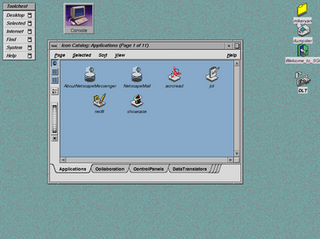
IRIX is a discontinued operating system developed by Silicon Graphics (SGI) to run on the company's proprietary MIPS workstations and servers. It is a variety of UNIX System V with BSD extensions. In IRIX, SGI originated the XFS file system and the universally adopted industry-standard OpenGL graphics system.
ISO 9660 is a file system for optical disc media. Being published by the International Organization for Standardization (ISO) the file system is considered an international technical standard. Since the specification is available for anybody to purchase, implementations have been written for many operating systems.

Windows 2000 is a business-oriented operating system that was produced by Microsoft in the United States and was released as part of the Windows NT family of operating systems. It was succeeded by Windows XP in 2001, releasing to manufacturing on December 15, 1999 and being officially released to retail on February 17, 2000. It is the successor to Windows NT 4.0.
XFS is a high-performance 64-bit journaling file system created by Silicon Graphics, Inc (SGI) in 1993. It was the default file system in SGI's IRIX operating system starting with its version 5.3. XFS was ported to the Linux kernel in 2001; as of June 2014, XFS is supported by most Linux distributions, some of which use it as the default file system.
NTFS is a proprietary journaling file system developed by Microsoft. Starting with Windows NT 3.1, it is the default file system of the Windows NT family.
Journaled File System or JFS is a 64-bit journaling file system created by IBM. There are versions for AIX, eComStation, OS/2, and Linux operating systems. The latter is available as free software under the terms of the GNU General Public License (GPL). HP-UX has another, different filesystem named JFS that is actually an OEM version of Veritas Software's VxFS.
Hierarchical File System (HFS) is a proprietary file system developed by Apple Inc. for use in computer systems running Mac OS. Originally designed for use on floppy and hard disks, it can also be found on read-only media such as CD-ROMs. HFS is also referred to as Mac OS Standard, while its successor, HFS Plus, is also called Mac OS Extended.
The Encrypting File System (EFS) on Microsoft Windows is a feature introduced in version 3.0 of NTFS that provides filesystem-level encryption. The technology enables files to be transparently encrypted to protect confidential data from attackers with physical access to the computer.
An extent is a contiguous area of storage reserved for a file in a file system, represented as a range of block numbers, or tracks on Count key data devices. A file can consist of zero or more extents; one file fragment requires one extent. The direct benefit is in storing each range compactly as two numbers, instead of canonically storing every block number in the range. Also, extent allocation results in less file fragmentation.
EFS may refer to:
Windows XP introduced many features not found in previous versions of Windows.
The Electronic Filing System is the Singapore Judiciary's electronic platform for filing and service of documents within the litigation process. In addition, it provides the registries of the Supreme Court and the Subordinate Courts with an electronic registry and workflow system; and an electronic case file. Recent enhancements have added a module which facilitates the conduct of hearing using documents that have been electronically filed.
There are a number of security and safety features new to Windows Vista, most of which are not available in any prior Microsoft Windows operating system release.
The Electronic Filing System of the United States Patent and Trademark Office (USPTO), also referred to as EFS-Web or simply EFS, is a web-based system for submitting patent applications and related documents electronically.
XFS is a computer file system created by Silicon Graphics.

The Integrated Electronic Litigation System (iELS) or eLitigation (eLit) is an initiative by the Singapore Judiciary to replace the existing Electronic Filing System (EFS) which has been in use since 2000. EFS was conceived and developed in the mid- to late-1990s, and iELS represents the second phase in implementing technology to enhance the litigation process in Singapore.
Amazon Elastic File System is a cloud storage service provided by Amazon Web Services (AWS) designed to provide scalable, elastic, concurrent with some restrictions, and encrypted file storage for use with both AWS cloud services and on-premises resources. Amazon EFS is built to be able to grow and shrink automatically as files are added and removed. Amazon EFS supports Network File System (NFS) versions 4.0 and 4.1 (NFSv4) protocol, and control access to files through Portable Operating System Interface (POSIX) permissions.
EFSS may refer to: